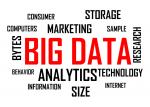Science has long since recognized it: Collecting and evaluating large amounts of data accelerates the learning process from hypothesis, falsification and new hypothesis. New interrelationships and new questions only arise from data analysis. Computer analysis no longer reveals whether an assumption rightly or wrongly exists; rather, it calls upon us to look at the overall context. Experts call this: “Let the data speak”.
Viktor Mayer-Schönberger of the Oxford Internet Institute, however, complained in an interview two years ago: “I expect the next major debate in science policy about access to data stocks. The question is whether researchers at universities or companies that receive state support also make their data sets publicly accessible and not just their results. …We need rules, clearly, but above all a data search and find structure to find the appropriate data records. How little has happened here so far is horrible.”
The system architecture developed by the Fraunhofer Institute and made accessible by the International Data Spaces Association (IDS) for a regulated exchange of data offers both science and companies an appropriate solution. The Advaneo datamarketplace, which is currently under construction, not only shows its practical implementation, but also offers an extensive range of open data to make data speak for science, companies or data scientists”-
